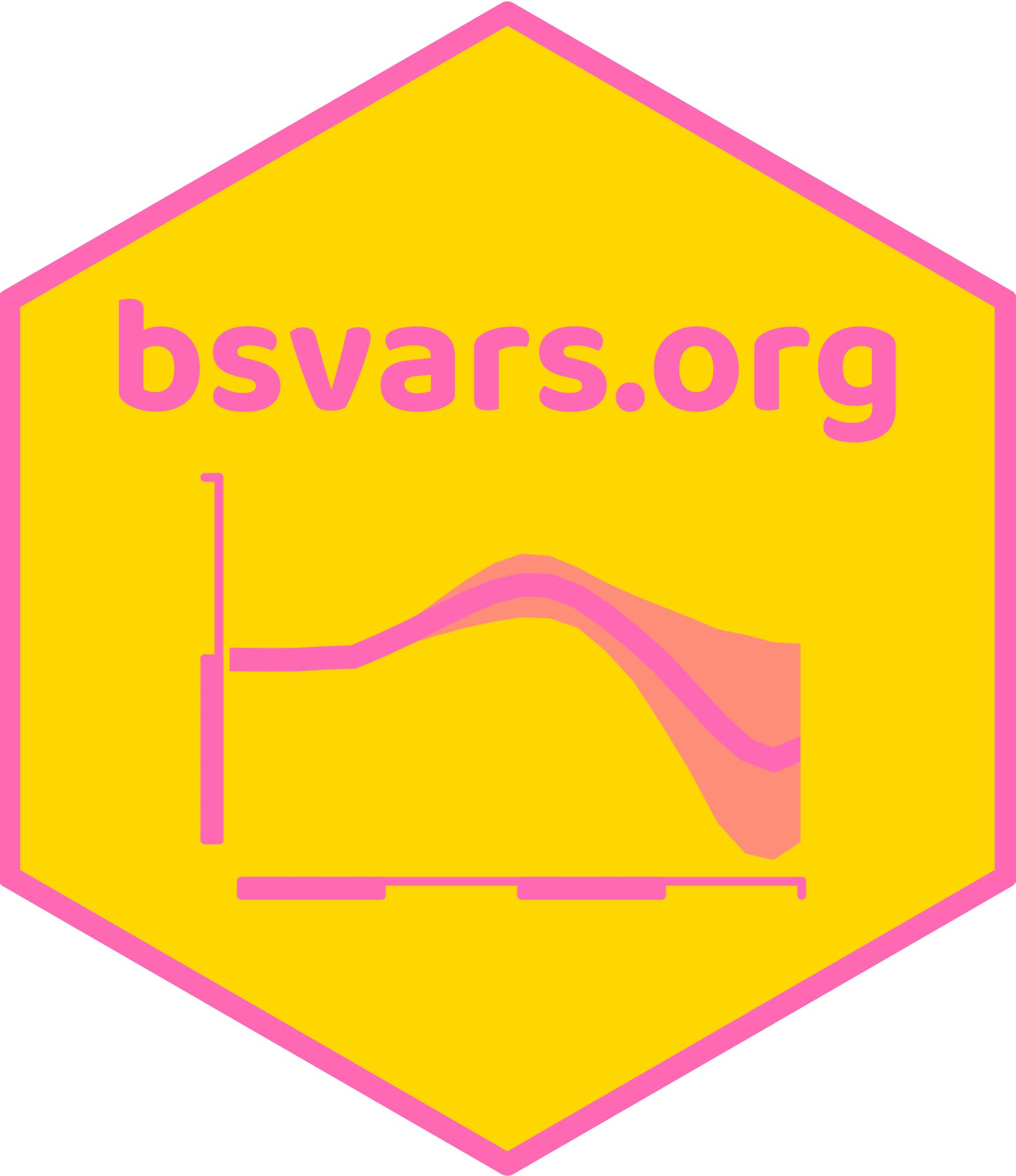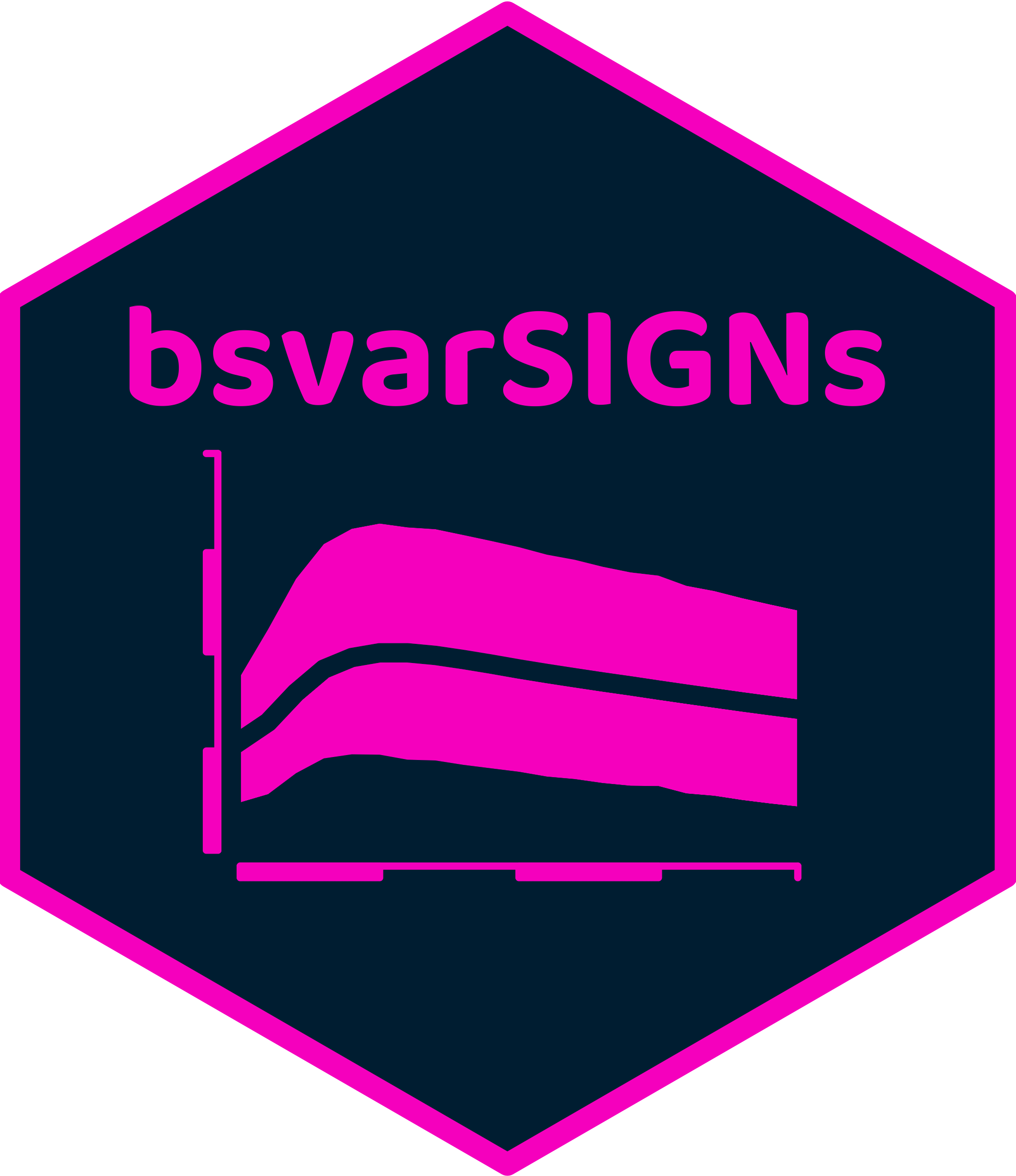Bayesian SVARs with Sign, Zero, and Narrative Restrictions.
bsvarSIGNs 
An R package for Bayesian Estimation of Structural Vector Autoregressions Identified by Sign, Zero, and Narrative Restrictions
The First Prize laureate of the Di Cook Open-Source Statistical Software Award granted by the Statistical Society of Australia in 2024
Implements state-of-the-art algorithms for the Bayesian analysis of Structural Vector Autoregressions identified by sign, zero, and narrative restrictions. The core model is based on a flexible Vector Autoregression with estimated hyper-parameters of the Minnesota prior and the dummy observation priors as in Giannone, Lenza, Primiceri (2015). The sign restrictions are implemented employing the methods proposed by Rubio-Ramírez, Waggoner & Zha (2010), while identification through sign and zero restrictions follows the approach developed by Arias, Rubio-Ramírez, Waggoner (2018). Furthermore, our tool provides algorithms for identification via sign and narrative restrictions, in line with the methods introduced by Antolín-Díaz & Rubio-Ramírez (2018). Users can also estimate a model with sign, zero, and narrative restrictions imposed at once. The package facilitates predictive and structural analyses using impulse responses, forecast error variance and historical decompositions, forecasting and conditional forecasting, as well as analyses of structural shocks and fitted values. All this is complemented by colourful plots, user-friendly summary functions, and comprehensive documentation including the vignette by Wang & Woźniak (2024). The bsvarSIGNs package is aligned regarding objects, workflows, and code structure with the R package bsvars by Woźniak (2024), and they constitute an integrated toolset. It was granted the Di Cook Open-Source Statistical Software Award by the Statistical Society of Australia in 2024.
Features
Structural Vector Autoregressions
- All the models in the bsvarSIGNs package consist of the Vector Autoregressive equation, with autoregressive parameters
Aand error termsE, and the structural equation with a structural matrixBand shocksU
Y = AX + E (VAR equation)
BE = U (structural equation)
- All the models feature a hierarchical Minnesota prior following the specification proposed by Giannone, Lenza, Primiceri (2015)
- The identification of the SVAR model is achieved by imposing:
- sign restrictions on the structural matrix $\mathbf{B}$,
- sign and zero restrictions on the zero-horizon impulse responses $\mathbf{\Theta}_0 = \mathbf{B}^{-1}$,
- sign restrictions on the impulse responses at other horizons $\mathbf{\Theta}_i$ for $i = 1, 2, \ldots$,
- sign restrictions on selected structural shocks $\mathbf{u}_t$,
- two types of sign restrictions on the historical decompositions.
Simple workflows
- Specify the models using
specify_bsvarSIGN$new()function - Estimate the models using the
estimate()method - Predict the future using the
forecast()method - Provide structural analyses using impulse responses, forecast error variance decompositions, historical decompositions, and structural shocks using functions
compute_impulse_responses(),compute_variance_decompositions(),compute_historical_decompositions(), andcompute_structural_shocks()respectively - Analyse the fitted values, time-varying volatility using functions
compute_fitted_values()andcompute_conditional_sd()respectively - Use
plot()andsummary()methods to gain the insights into the core of the empirical problem.
Fast and efficient computations
- Blazingly fast computations are obtained by combining
- the application of frontier econometric and numerical techniques, and
- the implementation using compiled code written in cpp
- It combines the best of two worlds: the ease of data analysis with R and fast cpp algorithms
- The algorithms used here are very fast. But still, Bayesian estimation might take a little time. Look at our beautiful progress bar in the meantime:
**************************************************|
bsvarSIGNs: Bayesian Structural VAR with sign, |
zero and narrative restrictions |
**************************************************|
Progress of simulation for 1000 independent draws
Press Esc to interrupt the computations
**************************************************|
0% 10 20 30 40 50 60 70 80 90 100%
[----|----|----|----|----|----|----|----|----|----|
***********************************
The hexagonal logo
This beautiful logo can be reproduced in R using this file.
Resources
- a vignette by Wang & Woźniak (2025)
- a website of the family of packages bsvars.org
- bsvarSIGNs on CRAN
- presentations:
- for students at Szkoła Główna Handlowa given in Warsaw in December 2024 featuring bsvars 3.2 and bsvarSIGNs 1.0.1]
- at Uniwersytet Warszawski given in Warsaw in December 2024 featuring bsvars 3.2 and bsvarSIGNs 1.0.1
- for students and researchers at Uniwersytet Ekonomiczny w Krakowie given in Cracow in December 2024 featuring bsvars 3.2 and bsvarSIGNs 1.0.1
- a youtube recording] for [Forecasting for Social Good
- for Forecasting for Social Good given online in December 2024 featuring bsvars 3.2 and bsvarSIGNs 1.0.1]
- for Bayesian Econometrics students at the University of Melbourne given in October 2024 featuring bsvarSIGNs 1.0.1
- for the QuantEcon lab at the Australian National University given in August 2024 featuring bsvars 3.1 and bsvarSIGNs 1.0.1
- at Monash University given in August 2024 featuring bsvars 3.1 and bsvarSIGNs 1.0
Examples
Replication of the results by Arias, Rubio-Ramírez, & Waggoner (2018).
# investigate the effects of the optimism shock
data(optimism)
# specify identifying restrictions:
# + no effect on productivity (zero restriction)
# + positive effect on stock prices (positive sign restriction)
sign_irf = matrix(c(0, 1, rep(NA, 23)), 5, 5)
# specify the model
specification = specify_bsvarSIGN$new(optimism * 100,
p = 4,
sign_irf = sign_irf)
# estimate the model
posterior = estimate(specification, S = 100)
# compute and plot impulse responses
irf = compute_impulse_responses(posterior, horizon = 40)
plot(irf, probability = 0.68)
Replication of the results by Antolín-Díaz and Rubio-Ramírez (2018).
# investigate the effects of the contractionary monetary policy shock
data(monetary)
# specify identifying restrictions:
# + sign restrictions on the impulse responses at horizons from 0 to 5
sign_irf = matrix(NA, 6, 6)
sign_irf[, 1] = c(NA, -1, -1, NA, -1, 1)
sign_irf = array(sign_irf, dim = c(6, 6, 6))
# + narrative sign restriction: the shock is positive in October 1979
sign_narrative = list(
specify_narrative(start = 166, periods = 1, type = "S", sign = 1, shock = 1),
specify_narrative(start = 166, periods = 1, type = "B", sign = 1, shock = 1, var = 6)
)
# specify the model
specification = specify_bsvarSIGN$new(monetary * 100,
p = 12,
sign_irf = sign_irf,
sign_narrative = sign_narrative)
# estimate the model
posterior = estimate(specification, S = 100)
# compute and plot impulse responses
irf = compute_impulse_responses(posterior, horizon = 60)
plot(irf, probability = 0.68)
Installation
The first time you install the package
You must have a cpp compiler. Follow the instructions from Section 1.3. by Eddelbuettel & François (2023). In short, for Windows: install RTools, for macOS: install Xcode Command Line Tools, and for Linux: install the standard development packages.
Once that’s done:
Just open your R and type:
install.packages("bsvarSIGNs")
The developer’s version of the package with the newest features can be installed by typing:
devtools::install_github("bsvars/bsvarSIGNs")
Development
The package is under intensive development. Your help is most welcome! Please, have a look at the roadmap and report a bug. Thank you!
About the authors
Xiaolei is a PhD candidate at the University of Melbourne. He is interested in Bayesian econometrics and time series analysis and is the author and maintainer of the bsvarSIGNs package.
Tomasz is a Bayesian econometrician and a Senior Lecturer at the University of Melbourne. He develops methodology for empirical macroeconomic analyses and programs in R and cpp using Rcpp.


